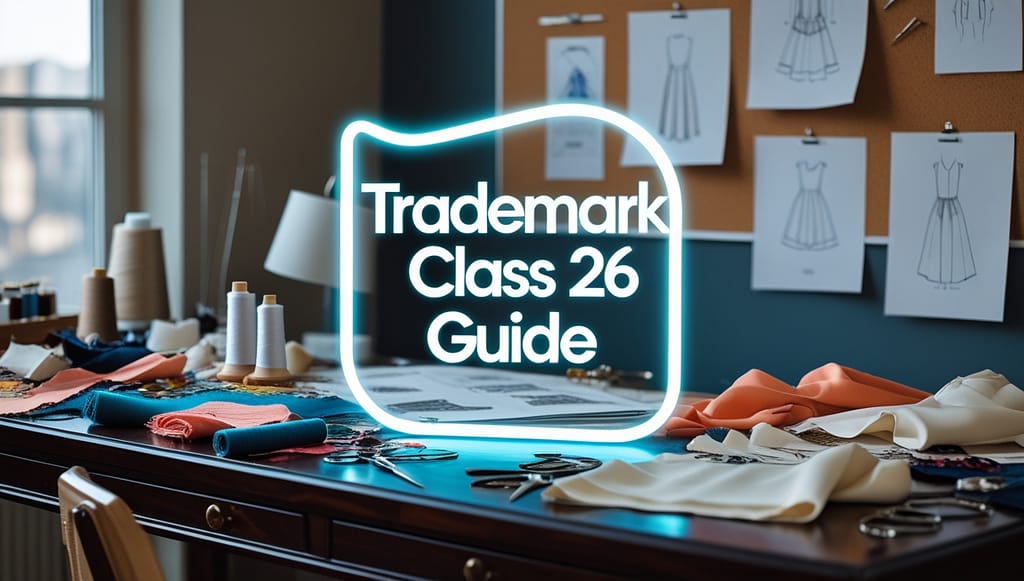What Is Trademark Class 26? Complete Guide for Accessories and Sewing Supplies
Introduction
In the fashion and textile world, brand identity is just as important as product quality. From a trendy clothing label to a brand that sells sewing supplies, every business needs to protect its uniqueness. That’s where trademark registration comes into play.
But trademarks aren’t “one-size-fits-all.” Every product or service belongs to a specific trademark class under the Nice Classification system, which is used globally—including in India. If your business deals in accessories, sewing supplies, buttons, zippers, or trims, then Trademark Class 26 is where your brand needs protection.
This guide will walk you through what Trademark Class 26 is, the types of products it covers, why it matters for businesses, and how to register your brand under this class.

What Is Trademark Class 26?
Trademark Class 26 is a category that covers a wide range of decorative and functional items used mainly in the textile, apparel, and fashion industries.
Some examples include:
- Sewing supplies (buttons, hooks, zippers, pins, needles)
- Decorative trims (lace, ribbons, braids, bows)
- Hair accessories (clips, bands, pins, barrettes)
- Artificial flowers and fruits
- Wigs, hair extensions, and related accessories
In simple words, if you manufacture or sell items that add detail, decoration, or functionality to clothing, fabrics, or personal styling, your products belong to Class 26.
Why Is Class 26 Important for Businesses?
Whether you are a sewing supply store, an accessories manufacturer, or a fashion brand, protecting your brand in Class 26 ensures:
- Exclusive Rights – Nobody else in the same category can use your brand name or logo.
- Brand Safety – Keeps counterfeit zippers, ribbons, or hairpins from using your identity.
- Consumer Trust – Customers know they’re buying authentic products.
- Business Expansion – You can expand your product range within Class 26 without losing legal protection.
✅ Example: A brand like YKK (famous for zippers) protects itself under Class 26 to maintain global trust and avoid counterfeiting.
Products Covered Under Trademark Class 26
Here’s a detailed look at what items are protected under this class:
1. Sewing and Fastening Supplies
- Buttons, hooks, eyes, and snap fasteners
- Zippers and sliders
- Pins (safety pins, sewing pins, dressmaker pins)
- Needles (hand sewing, knitting, and embroidery needles)
2. Decorative Items for Clothing & Fabrics
- Ribbons, lace, braids, and fringes
- Bows, rosettes, and embroidery patches
- Ornamental trimmings for garments
3. Hair Accessories
- Hairpins, clips, barrettes, and hairbands
- Elastic bands for hair
- Wigs, hairpieces, and extensions
4. Artificial Decorative Products
- Artificial flowers, leaves, fruits, and wreaths
- Decorative beads not used for jewelry
5. Miscellaneous Items
- Prize ribbons and badges (not made of precious metals)
- Haberdashery supplies used in clothing and crafts
👉 Note: Jewelry, real flowers, and actual fabric materials are not covered under Class 26. They belong to other classes (Class 14, Class 31, and Class 24 respectively).
Difference Between Class 26 and Similar Classes
To avoid confusion, here’s how Class 26 differs from nearby classes:
- Class 24 (Textiles & Fabrics) – Protects fabrics and textile materials, not trims or accessories.
- Class 25 (Clothing, Footwear, Headgear) – Protects finished garments and shoes, not sewing supplies.
- Class 3 (Cosmetics) – Covers beauty products like hair sprays or shampoos, not wigs or hairpins.
So, if you sell buttons and zippers, Class 26 is correct. If you sell finished shirts, you need Class 25.
Benefits of Registering a Trademark in Class 26
- Legal Ownership – You get exclusive rights to your brand name and logo.
- Stop Counterfeiting – Easily take action against fake accessory sellers.
- E-commerce Protection – Platforms like Amazon and Flipkart support registered brands.
- Brand Recognition – A registered mark builds trust among customers.
- Business Expansion – Future-proof your brand as you add more sewing or accessory products.
Step-by-Step Guide to Trademark Registration in Class 26
Here’s how to protect your accessories or sewing supplies brand in India:
Step 1: Conduct a Trademark Search
- Visit the IP India Public Search Portal.
- Check if your brand name or logo is already registered under Class 26.
- Avoid similar or generic names.
Step 2: Choose the Type of Trademark
You can register:
- Word Mark – Your brand name (e.g., “StitchPro”)
- Logo Mark – Your logo or symbol
- Combination Mark – Both name and logo together
Step 3: File the Application
- File online at the IP India portal.
- Government fees: ₹4,500 (for individuals/startups) or ₹9,000 (for companies).
Step 4: Examination by Trademark Registrar
- The Registrar checks your application for conflicts or errors.
- If issues arise, you may need to reply to an Examination Report.
Step 5: Publication in Trademark Journal
- If accepted, your mark is published for public opposition.
- Anyone can oppose it within 4 months.
Step 6: Registration Certificate
- If no opposition is raised, you get your Class 26 trademark certificate.
- Validity: 10 years, renewable indefinitely.
Common Mistakes to Avoid in Class 26 Trademark Filing
- Not Doing a Proper Search – Leads to rejection if a similar brand exists.
- Using Descriptive Names – “Button Store” or “Ribbon World” may be rejected as too generic.
- Not Registering the Logo – Always protect both name and design.
- Delaying Registration – Someone else may take your name.
- Wrong Class Selection – Filing in Class 24 or 25 instead of 26 wastes time and money.
Real-World Examples of Class 26 Brands
- YKK – Famous zipper company with global trademark protection.
- Velcro – Trademarked its unique fastening products under Class 26.
- Goody – Hair accessory brand protecting clips and bands in Class 26.
These examples show how big brands rely on Class 26 to stay secure.
Why Work With Professionals?
Trademark law can be confusing—especially when deciding which class to file in. Working with experts ensures:
- Correct classification
- Strong application drafting
- Quick handling of objections or oppositions
- Hassle-free renewals
At VMK Professionals, we specialize in trademark filing for accessory and sewing supply brands. Our team helps you:
- Conduct a full trademark search
- File your Class 26 application
- Handle objections or oppositions
- Manage renewals and expansions
Conclusion
If your business sells sewing supplies, accessories, trims, or decorative items, then Trademark Class 26 is crucial for your brand protection.
By registering your trademark in this class, you get:
- Exclusive rights over your brand name and logo
- Protection against counterfeiters and copycats
- Legal enforcement power
- A trusted identity in the fashion and accessories market
With the fashion and craft industries growing rapidly in India, securing your brand identity today means safeguarding your business for tomorrow.
👉 Ready to trademark your Class 26 brand? Contact VMK Professionals for expert assistance and protect your sewing supply or accessory business with confidence.



















